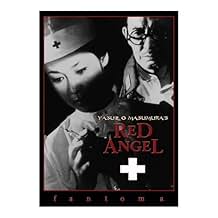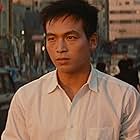During the Sino-Japanese War, a young army nurse gives sympathy to her patients and falls in love with an impotent doctor who's addicted to morphine.During the Sino-Japanese War, a young army nurse gives sympathy to her patients and falls in love with an impotent doctor who's addicted to morphine.During the Sino-Japanese War, a young army nurse gives sympathy to her patients and falls in love with an impotent doctor who's addicted to morphine.
- Director
- Writers
- All cast & crew
- Production, box office & more at IMDbPro
Storyline
Did you know
- TriviaThe film contains some gruesome sequences of surgery without anaesthetic and the removal of limbs with saws. Not for the squeamish.
- GoofsSeveral dead bodies are clearly seen to be breathing slightly throughout the film.
Featured review
What is this film if not a portraiture of both the ugliness and complexities of war as they impact even those who are not specifically on the front lines? In focusing on nurse Nishi Sakura we're given a protagonist who feels deep sympathy for her soldier patients and those around her, and takes that sympathy to extremes, even if said patients wrong her. There is also substantial reflection herein on the absurdities of war with regards to conscription, and how draftees' skills are warped and misused in the military; the endless stream of casualties, and the twisted mindset that may gift promotions; how soldiers are mistreated by their own leaders, the abuses endured by doctors, nurses, and support staff, and still more, including the ways both literal and proverbial in which anyone involved in such madness may self-medicate. Though filmed in black and white there is major grisliness throughout 'Red angel' as many shots and scenes depict the blood and gore of field hospitals, the long lines of full beds, dirtied surgical instruments, removed bullets and shrapnel, and more. Largely bereft of the action sequences of the average war movie, this drama nevertheless speaks unflinchingly to the horrors of war. Moreover, there is no glorification whatsoever of martial strife, or of the soldier life, and really the opposite is true: from one scene to the next heavy emphasis is placed on criticizing war, and how the military treats even their own.
Furthermore, there is significant treatment herein of the horrid intersection of sex and lust with the gender dynamics of military logistics. However terribly fallacious in reality, in an echo of some of the most toxic strains of male thought that endure even in modern society there is direct linkage between sexual potency and masculinity, and the loss of the former is equated to loss of the latter. Just as drills, discipline, and the command to kill may be cynically viewed as reducing the soldier to an unthinking beast, that demanded atavistic impulse extends to how women are treated by soldiers, specifically, and more generally, the military, and men. Truthfully, at times this feature is a hair's breadth away from sado-erotic exploitation, and one can easily envisage how it may have looked had it been made with the sensibilities of some such genre fare in the 1970s, or even if another filmmaker like Oshima Nagisa ('In the realm of the senses') had taken on the project. While do we also get bits and pieces of the battle violence of other pictures that handle the same subject matter, far more than not 'Red angel' steps back from the usual explosions and gunfire to show us another side of war - and if anything even more so with that broad declination, from every corner Masumura Yasuzo gives us a sordid saga that wavers on the razor's edge between accentuating how war strips people of their humanity, and zeroing in on characters who desperately try to retain their humanity and sense of self.
There is abundant, meaningful value herein, however achingly grim and dreary. Ikeno Sei's tremendous original score is plainly haunting as it further lends to the gloom, and the production values are top-notch with image and audio that are equally crisp. The production design and art direction are outstanding, and the visuals are flush with incredible detail in the sets, costume design, hair and makeup, crimson and viscera, and props and weapons. Those stunts and effects that are employed are vivid and finely executed, as fine as in any kindred genre fare, and only further cement the dourness in how they are used. Masumura's direction is marvelously smart and adept, ably navigating the subtly shifting moods of the difficult spaces between the most dubious, uncomfortable, and seedy ideas, the traces of human warmth, the stark underlying themes, and the overarching bleakness, and he does so in a manner that unfailingly brings out the best of the cast. Wakao Ayako certainly stands out most in the lead role as Nishi, but she is joined in her excellence by all those in supporting parts, from prominent Ashida Shinsuke to those in smaller roles like Kawazu Yusuke. The material is tough, demanding delicate range and nuance in maneuvering between dangerously impassioned, quietly thoughtful, highly emotive, and unnerved trauma, but Wakao and her co-stars give terrific performances that increasingly impress.
Above all, in penning his adapted screenplay, writer Kasahara Ryozo saturates the title with simmering outrage at the damage war wreaks not just on people's bodies and lives but their psyche. The humanity that peeks through 'Red angel,' represented primarily but not exclusively in Nurse Nishi and Dr. Okabe, is refreshing relief when stood next to the poisonous barbarism that has been infused into soldiers, the amoral tinkering of military leadership that treats people like disposable tools, and the numbing routine of encountering death and devastation every day. And still even Nishi and Okabe are not free from these horrors as they themselves fall victim to violence, adopt fatalistic attitudes, and turn to self-destructive behaviors of various stripes to cope with it all. I think all these themes may have been stronger still had Nishi in particular been fleshed out a tad more - that is, if we spent even only a few minutes seeing who she was before she became another pawn in the machinations of war - but even at that the characters are written with depth and complications that are a big part of what makes the film so spellbinding. This is hardly any less true of the rich, mindful dialogue, and the scene writing is vibrant in the best and worst of ways in filling out a fiercely compelling, harrowing narrative. If in a different manner, Masumara's movie reminds me of the scathing anti-war sentiments of Abel Gance's disquieting silent epic 'J'accuse,' or the stridently criticism of the military that is Stanley Kubrick's 'Paths of glory.' This joins some esteemed company.
There are two more salient points that one would be awfully remiss not to discuss. First is that Kasahara and Masumara waste no time in confronting us with one of the most shocking sequences of the feature, and while it is part and parcel of what 'Red angel' does broadly, the incidence is jolting and makes a poor first impression as it presents. The entire episode with Sakamoto is immensely troubling, and I think the shakiest portions of the writing are the first out of the gate. Even if we accept that Nishi has a practically pathological need to sympathize, and be the nurse that her patients need, the first approximate third of the runtime left me skeptical. And there's also this: is the unwavering, trenchant tenor of the picture bolstered by the fact that the story centers the Japanese army in China during World War II? Or does that make it all problematic? This doesn't speak directly to all the many war crimes that Imperial Japan committed against the Chinese, but certainly to some; is the tone duly harsh in its criticism, or not enough so? Kasahara and Masumara do not for one moment romanticize or lionize, and the most sympathetic characters are but cogs in the war machine as the script reservedly but unmistakably lashes out against the inhumanity imposed upon people by war; does this balance out the fact of the plot centering the aggressors in a massive, deadly conflict? I don't have the answers to these questions. I know only that if nothing else, no matter how deserving it may otherwise be, 'Red angel' has an asterisk next to its name.
However much we can, should, and must dissect such facets, though, the incontrovertible truth is that by and large this is fantastic. It's raptly absorbing, and very much thought-provoking; that some elements raise an eyebrow or merit scrutiny does not undercut the overall strength. I found myself doubting this title initially, but as the tale advanced I was drawn in more and more, and once the complete image emerges of what the filmmaker was doing here, the result is greatly satisfying. Especially given the nastiness of the material this won't appeal to all comers, nor meet with equal favors, and it bears repeating that there are aspects of the work that require earnest, probing analysis. Be that as it may, far more than not 'Red angel' is a superb classic that deserves more recognition, and I would definitely recommend it to anyone who is receptive to such movies that explore the darker side of life.
Furthermore, there is significant treatment herein of the horrid intersection of sex and lust with the gender dynamics of military logistics. However terribly fallacious in reality, in an echo of some of the most toxic strains of male thought that endure even in modern society there is direct linkage between sexual potency and masculinity, and the loss of the former is equated to loss of the latter. Just as drills, discipline, and the command to kill may be cynically viewed as reducing the soldier to an unthinking beast, that demanded atavistic impulse extends to how women are treated by soldiers, specifically, and more generally, the military, and men. Truthfully, at times this feature is a hair's breadth away from sado-erotic exploitation, and one can easily envisage how it may have looked had it been made with the sensibilities of some such genre fare in the 1970s, or even if another filmmaker like Oshima Nagisa ('In the realm of the senses') had taken on the project. While do we also get bits and pieces of the battle violence of other pictures that handle the same subject matter, far more than not 'Red angel' steps back from the usual explosions and gunfire to show us another side of war - and if anything even more so with that broad declination, from every corner Masumura Yasuzo gives us a sordid saga that wavers on the razor's edge between accentuating how war strips people of their humanity, and zeroing in on characters who desperately try to retain their humanity and sense of self.
There is abundant, meaningful value herein, however achingly grim and dreary. Ikeno Sei's tremendous original score is plainly haunting as it further lends to the gloom, and the production values are top-notch with image and audio that are equally crisp. The production design and art direction are outstanding, and the visuals are flush with incredible detail in the sets, costume design, hair and makeup, crimson and viscera, and props and weapons. Those stunts and effects that are employed are vivid and finely executed, as fine as in any kindred genre fare, and only further cement the dourness in how they are used. Masumura's direction is marvelously smart and adept, ably navigating the subtly shifting moods of the difficult spaces between the most dubious, uncomfortable, and seedy ideas, the traces of human warmth, the stark underlying themes, and the overarching bleakness, and he does so in a manner that unfailingly brings out the best of the cast. Wakao Ayako certainly stands out most in the lead role as Nishi, but she is joined in her excellence by all those in supporting parts, from prominent Ashida Shinsuke to those in smaller roles like Kawazu Yusuke. The material is tough, demanding delicate range and nuance in maneuvering between dangerously impassioned, quietly thoughtful, highly emotive, and unnerved trauma, but Wakao and her co-stars give terrific performances that increasingly impress.
Above all, in penning his adapted screenplay, writer Kasahara Ryozo saturates the title with simmering outrage at the damage war wreaks not just on people's bodies and lives but their psyche. The humanity that peeks through 'Red angel,' represented primarily but not exclusively in Nurse Nishi and Dr. Okabe, is refreshing relief when stood next to the poisonous barbarism that has been infused into soldiers, the amoral tinkering of military leadership that treats people like disposable tools, and the numbing routine of encountering death and devastation every day. And still even Nishi and Okabe are not free from these horrors as they themselves fall victim to violence, adopt fatalistic attitudes, and turn to self-destructive behaviors of various stripes to cope with it all. I think all these themes may have been stronger still had Nishi in particular been fleshed out a tad more - that is, if we spent even only a few minutes seeing who she was before she became another pawn in the machinations of war - but even at that the characters are written with depth and complications that are a big part of what makes the film so spellbinding. This is hardly any less true of the rich, mindful dialogue, and the scene writing is vibrant in the best and worst of ways in filling out a fiercely compelling, harrowing narrative. If in a different manner, Masumara's movie reminds me of the scathing anti-war sentiments of Abel Gance's disquieting silent epic 'J'accuse,' or the stridently criticism of the military that is Stanley Kubrick's 'Paths of glory.' This joins some esteemed company.
There are two more salient points that one would be awfully remiss not to discuss. First is that Kasahara and Masumara waste no time in confronting us with one of the most shocking sequences of the feature, and while it is part and parcel of what 'Red angel' does broadly, the incidence is jolting and makes a poor first impression as it presents. The entire episode with Sakamoto is immensely troubling, and I think the shakiest portions of the writing are the first out of the gate. Even if we accept that Nishi has a practically pathological need to sympathize, and be the nurse that her patients need, the first approximate third of the runtime left me skeptical. And there's also this: is the unwavering, trenchant tenor of the picture bolstered by the fact that the story centers the Japanese army in China during World War II? Or does that make it all problematic? This doesn't speak directly to all the many war crimes that Imperial Japan committed against the Chinese, but certainly to some; is the tone duly harsh in its criticism, or not enough so? Kasahara and Masumara do not for one moment romanticize or lionize, and the most sympathetic characters are but cogs in the war machine as the script reservedly but unmistakably lashes out against the inhumanity imposed upon people by war; does this balance out the fact of the plot centering the aggressors in a massive, deadly conflict? I don't have the answers to these questions. I know only that if nothing else, no matter how deserving it may otherwise be, 'Red angel' has an asterisk next to its name.
However much we can, should, and must dissect such facets, though, the incontrovertible truth is that by and large this is fantastic. It's raptly absorbing, and very much thought-provoking; that some elements raise an eyebrow or merit scrutiny does not undercut the overall strength. I found myself doubting this title initially, but as the tale advanced I was drawn in more and more, and once the complete image emerges of what the filmmaker was doing here, the result is greatly satisfying. Especially given the nastiness of the material this won't appeal to all comers, nor meet with equal favors, and it bears repeating that there are aspects of the work that require earnest, probing analysis. Be that as it may, far more than not 'Red angel' is a superb classic that deserves more recognition, and I would definitely recommend it to anyone who is receptive to such movies that explore the darker side of life.
- I_Ailurophile
- Jun 19, 2024
- Permalink
- How long is The Red Angel?Powered by Alexa
Details
- Release date
- Country of origin
- Language
- Also known as
- Red Angel
- Production company
- See more company credits at IMDbPro
- Runtime1 hour 35 minutes
- Color
- Aspect ratio
- 2.35 : 1
Contribute to this page
Suggest an edit or add missing content
























